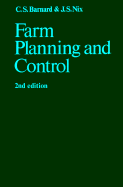Book contents
- Frontmatter
- Contents
- Notice to readers
- Preface to the first edition
- Preface to the second edition
- Selected metric conversion factors
- Part I The organisation of resources
- 1 The planning environment and the managerial function
- 2 Basic principles and concepts of planning
- 3 The organisation of capital – general
- 4 The organisation of capital – machinery, buildings and land
- 5 The organisation of labour
- Part II The organisation of enterprises
- Part III The combination of enterprises
- Part IV The control of resources and enterprises
- Selected further reading
- Index
1 - The planning environment and the managerial function
Published online by Cambridge University Press: 01 June 2011
- Frontmatter
- Contents
- Notice to readers
- Preface to the first edition
- Preface to the second edition
- Selected metric conversion factors
- Part I The organisation of resources
- 1 The planning environment and the managerial function
- 2 Basic principles and concepts of planning
- 3 The organisation of capital – general
- 4 The organisation of capital – machinery, buildings and land
- 5 The organisation of labour
- Part II The organisation of enterprises
- Part III The combination of enterprises
- Part IV The control of resources and enterprises
- Selected further reading
- Index
Summary
The purpose of planning
The first question which arises is why farm planning should be regarded as necessary. The answer may be sought by turning to the tenets of production economics embodied in what is known as the 'theory of the firm'. The firm represents the business or decision-making unit in an industry and involves the producer (or 'entrepreneur') in the manipulation of resources in order to obtain output. In farming, the farm is the firm and the farmer or manager the entrepreneur. The need to plan production arises from three basic factors:
Individuals have various wants which they seek to satisfy.
The means available to satisfy these wants are in scarce supply.
The means available can be put to many different uses.
The planning problem is thus one of allocating scarce resources amongst various uses in a way that best satisfies the wants of the individual.
Thus far, we have simply a general statement as much applicable to a consumer allocating his income amongst his many competing needs as to a producer deciding what to produce. It may now be considered in greater detail in the context of farming.
Objectives
The wants of individuals are expressed as objectives which they aim to fulfil. Clearly producers must have an objective (or objectives), otherwise there would be nothing to guide their choice between alternative courses of action.
- Type
- Chapter
- Information
- Farm Planning and Control , pp. 3 - 18Publisher: Cambridge University PressPrint publication year: 1980



